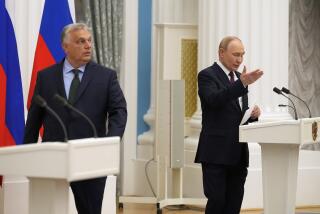Rights Queries Dog Gorbachev on Paris Visit
- Share via
PARIS — No matter how hard he tried to charm the French, no matter how hard he lectured them, Soviet leader Mikhail S. Gorbachev could not persuade the French during his four-day visit here to drop their persistent, annoying questions about violations of human rights in the Soviet Union.
The issue dogged Gorbachev throughout his official visit, provoking him into shows of testiness and bad humor. It was obvious that he and his aides were not prepared for the vehemence of French anger and concern over treatment of Soviet dissidents.
There is little doubt that only a gesture by Gorbachev on the issue of human rights would have persuaded many French intellectuals that the new Soviet leader is serious about modernizing the Soviet Union.
Spectacular Announcement
Some intellectuals even speculated that Gorbachev might galvanize French public opinion to his side with a spectacular gesture--perhaps even an announcement of the release of Soviet physicist Andrei D. Sakharov from his exile in Gorky or of dissident Anatoly Shcharansky from jail.
The West German news magazine Der Spiegel reported Saturday that Sakharov and Shcharansky would be released following Gorbachev’s meeting with President Reagan in Vienna on Nov. 19-20.
The magazine said talks for their release are under way between Moscow and Washington with East German lawyer Wolfgang Vogel acting as an intermediary. Vogel has played a key role in previous East-West swaps of spies and dissidents. The magazine made no mention of what, if anything, the Soviet Union would receive in exchange for the release of the two Russians.
Gorbachev offered no hint of the reported talks and made no gesture on human rights. Instead, he showed annoyance over questions on the subject, shunting some aside with short, cold replies, refusing to reply to others. On this issue, he left the French with an image of stubbornness and toughness.
When Gorbachev met Thursday with Premier Laurent Fabius, the latter handed him a list of seven cases of violations of freedom in the Soviet Union. Neither Fabius nor Gorbachev made the list public, but a French government spokesman described one case as that of a political prisoner and the six others as cases of husbands and wives or parents and children unable to see or live with each other because of travel restrictions.
Asked at a news conference Friday what he intended to do with the list, Gorbachev replied curtly that he would turn it over to “the proper authorities.”
Mayor’s Accusation
At a welcoming ceremony at City Hall, Gorbachev stood impassively while Mayor Jacques Chirac of Paris, the former premier who leads the Gaullist party of France, accused the Soviet Union of failing to live up to its human rights pledges in the 1975 Helsinki agreement.
“I think with emotion of all those deprived of freedom because of their convictions,” Chirac said. “I am also thinking of those Jews who are not allowed to leave the country.”
Gorbachev’s problems with the issue began on the day before he arrived when a French television channel telecast a live interview with the Soviet leader from Moscow. Gorbachev seemed smooth and thoughtful at first but lost his temper when news anchor Yves Mourousi asked if there were 4 million political prisoners in the Soviet Union.
“That’s absurd,” said Gorbachev. “That’s just propaganda. I mean that’s absurd, and I must say that I’m very disappointed, and I even object that you, sir, could pose such a question, a modern man, a contemporary man, well-educated, well-read. I mean it’s absurd, it’s just absurd.”
France banned all street marches and demonstrations during the visit, but that did not prevent an incident while Gorbachev was laying a wreath at the Tomb of the Unknown Soldier at the Arc de Triomphe. A Frenchman, carrying the flag of the organization of children of Jews murdered in Nazi extermination camps, tried to rush at Gorbachev with a letter. But police grabbed him and hustled him away.
Change in Attitude
The extensive concern for human rights stems from a deep change in the attitude of French intellectuals toward the Soviet Union in the last 15 years. For decades after World War II, it was fashionable for intellectuals to dismiss accusations against the Soviet Union of rights abuses as American propaganda.
But the publication of Alexander I. Solzhenitsyn’s “Gulag Archipelago,” cataloguing innumerable Soviet crimes against human rights, shook the thinking of many leftists and turned them against the Soviet Union. It is now fashionable among leftists to be both anti-Communist and anti-Soviet Union.
The fashion has spread as well to young conservatives who once accepted the view of the late President Charles de Gaulle that France had some kind of special relationship with the Soviet Union. Always anti-Communist, these young conservatives have become anti-Soviet Union in recent years, especially on the issue of human rights.
More to Read
Sign up for Essential California
The most important California stories and recommendations in your inbox every morning.
You may occasionally receive promotional content from the Los Angeles Times.













